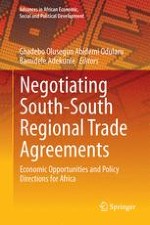This book provides a comprehensive analysis of South-South regional trade issues, with a particular focus on sustainably fostering Africa’s regional trade agenda. It examines the extent to which South-South regional trade agreements (RTAs) have contributed toward enhancing regional integration and economic expansion in Africa in particular, and in the South in general. The authors recommend new conceptual frameworks, appropriate initiatives, and workable policy recipes to help South-South RTAs enhance Africa’s economic transformation trajectory.
The book underscores the geo-politics, as well as the opportunities and challenges that emerging economies now represent for Africa in the context of South-South regional trade policy. Readers will learn how Africa can strengthen its regional trade game by securing and building on the positive outcomes of South-South RTAs.
